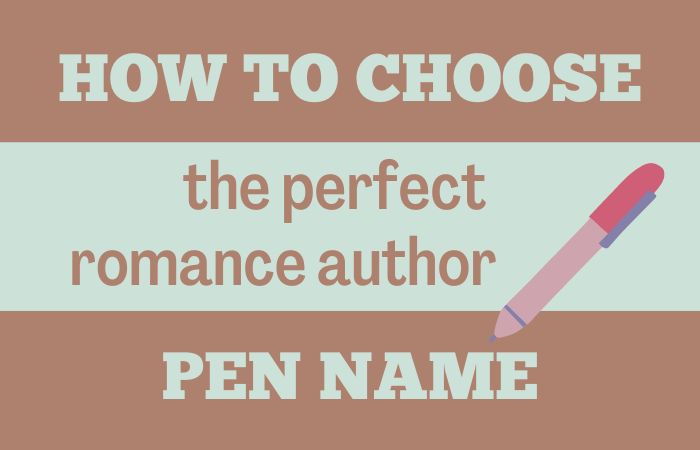Finding your romance alias: The journey to your ideal pen name
Choosing the right pen name is kind of like finding your one true love–it’s critical to your long-term happiness and often requires exploring lots of options before settling on the perfect fit.
Back in the days when I attended in-person romance writing meetings (RWA and then our break-off group), we had heated debates about why a person would want to publish under a made-up name. Some people felt it was important to hide their true identity, while others believed just as strongly that people who used a fake name were communicating that they had something to hide—which felt unethical.
Why I write with a pen name
When I published my first work of fiction, I used my real name, which, I admit scared me. But at the time I leaned more toward the, “I have nothing to hide” belief.
As I learned more about publishing and how to turn my hobby into a career, I met over a hundred romance authors who were farther along their path than I was. And what I learned was that the majority published with pen name.
My decision to publish romance under a pen name was made strategically since I also publish non-fiction and, when I first started writing romance, was most known in the work world as a non-fiction ghost-writer. It would have been confusing to see one name with a list of publication credits that included financial literacy curriculum, how to titles, and steamy romance.
And so, I embarked on a many week adventure of dating several names before meeting the one that I would fall in love with: Danika Bloom.
Before I walk you through the questions to consider when picking your own perfect alias, here are some romance authors who also publish under names other than the ones their mama’s gave them. And for the record, these authors are all open about using pen names—I’m not outing anyone.
A few romance authors who publish under an assumed name
-
-
-
-
-
-
-
-
-
-
- Bella Andre
- Christina Lauren (a writing duet)
- E.L. James
- Elena Johnson aka Liz Isaacson & Jessie Newtown
- Jayne Ann Krentz aka Jayne Castle
- Jennifer Armentrout aka J. Lynn
- Jodi Ellen Malpas aka J.E. Malpas
- Julia Quinn
- L.L. Schulz
- Laura Kaye aka Laura Kamoie
-
-
-
-
-
-
-
-
-

- Lorraine Heath aka Rachel Hawthorne & J.A. London & Jade Parker
- Nora Roberts aka J.D. Robb
- Sarah MacLean
- Sherrilyn Kenyon
- Sophie Kinsella
- Sylvia Day aka S.J. Day & Livia Dare
- Tessa Dare
- Victoria Holt
Reasons to use a pen name
If you haven’t thought about using a nom de plume—you’re planning to publish under your real name—my intention is not to convince you to do otherwise. But, if you haven’t thought about these reasons other authors have chosen to use an alias, it can be fun to at least play with names that might be a better fit for your author brand.
Whether you choose to go by your real name or opt for a pseudonym, what matters most is that you feel comfortable and confident in your author identity.
Privacy
Pseudonyms protect personal identity and maintain a boundary between professional and private life.
Branding
A well-chosen pen name can resonate with a target audience, ensuring books are easily identified and associated with a specific writing style.
Creative freedom
Pseudonyms offer writers the liberty to experiment across genres without compromising an existing brand reputation.
Meeting reader expectations
Separate pen names can prevent reader confusion, especially for authors who write in different sub-genres (steamy contemporray and sweet small town, fo instance) or entirely different genres.
Legal contraints
Publishing contracts might necessitate the use of a pen name.
How to choose the perfect pen name
Choosing a pen name is your chance to add some spice and flair to your writing persona. Play around with different combinations of names and surnames that sound romantic, catchy, and memorable.
Step 1: Connect with your writer persona
Before you start brainstorming pen names, take a moment to reflect on your author persona. Are you a fiery, passionate romance author who loves to write sizzling hot scenes? Or are you more of a sweet and tender storyteller who specializes in heartwarming tales of love? Understanding your author persona will help you choose a pen name that aligns with your writing style and genre.
Step 2: Do lots of sub-genre-based research!
The genre and target audience of your romance novels should play a significant role in choosing your pen name. If you write historical romance, for example, you may want to choose a pen name that sounds classic and evokes a sense of nostalgia. If you write contemporary romance, on the other hand, you may want to go for a more modern and trendy pen name. Understanding your genre and target audience will help you create a pen name that resonates with your readers.
Take some time to list all the romance author names you can think of off the top of your head. What makes them memorable? Now go to Amazon.com and take a look at the bestsellers in the romance sub-genre you’ll be writing in. If you’re not sure yet, look at the main list of bestsellers.
What can you glean from the names at the top of the list? Do they have anything in common? Do they tend to be short? Do they tend to have a family name that is a noun or something visual? Do they use initials as a first name?
You won’t find 100% consistency but make a note of what you notice so you can play with those ideas in your own name creatio
Step 3: Aim for simplicity
When it comes to pen names, simplicity is key. Avoid names that are too long, difficult to spell, or hard to pronounce. You want readers to easily remember and recognize your pen name, so they can both find your books easily and tell their friends about the great author they just found.
Another great tip I was advised (and ignored!) was to choose three-syllable name—first and last together. Three syllables is said to be easier to remember than longer names and has the benefit of (very likely) taking up less cover real estate, leaving more room for your future bestseller status line!
Even though a pen name like Valentina Kissingwell, Fanny Tickler, or Bella Lovejoy would be memorable, I’m not sure any of those would be taken seriously in the competitive world of romance writing. While full creativity is always encouraged during brainstorming, dial it back if the names you start thinking of sound like a joke or a parody. Save those fun names for your characters!
Step 4: Time to brainstorm
My own hindsight advice is to write all your ideas in a notebook you plan to hold onto. Make a list of first names that appeal to you. Make a list of family names that you’d love to have on a business card—and book covers!
If your list is short or you’re not feeling inspired, try what I ultimately did to figure out my perfect pen name. Put your full real name into a tool that will make it into an anagram and see if anything sparks joy. Don’t be too precious about creating a true anagram, though! You’re allowed to add letters to create the perfect-for-you name. (If I hadn’t done this, my pen name would have been Danika Blo … not a great last name to project the feeling of success!)
Once you have your starter list, the actual hard work starts!

Step 5: Avoid duplicates
The goal now is to eliminate, eliminate, eliminate. Pop back over Amazon.com and search for the top ten names on your list. While it’s fine to choose a name that doesn’t have a unique first or family name, you do want to be careful that the complete name you choose is not identical to, even too close to another author’s.
I was published in non-fiction under my real name back in the late 90s and as recently as 2021 (tin English) and 2022 (in a Korean translation). My real name is as common as muck so I wasn’t surprised when another non-fiction author started mixing up with the books assigned to me on Goodreads. It’s frustrating on many levels.
Step 6: Steer clear of potential lawsuits
Once you’ve determined the name is not being used by an author, check Google to make sure it’s not already claimed by any famous or high-profile people (or products!). While having a birth certificate that shares the same name as someone in the public eye is defensible (my real name is also “owned” by a famous Christian singer), it’s risky to choose the same name as someone who might have already—or could one day—copyright the name (yes, pen names can be copyrighted but our real names cannot be, weird as that is).

Step 7: Test your pen name
Once you’ve come up with a list of two to three potential pen names, don’t rush into a commitment just yet! Test-drive your pen name in different writing circles, forums, or social media profiles. See how it feels to introduce yourself with that pen name and how others react to it. Make sure you absolutely love your pen name! It should feel like a perfect match for your writing style, genre, and author persona. Your pen name should make you feel excited and proud to be associated with it.
A piece of advice I got from my friends when I was going through the process was to pick a name that sounded close enough to my real name that, if someone called to me at a conference (or in a shopping mall— we can all dream!) that I’d register it as mine and react. She spoke from embarrassing first-hand experience of having ignored people calling her pen name.





